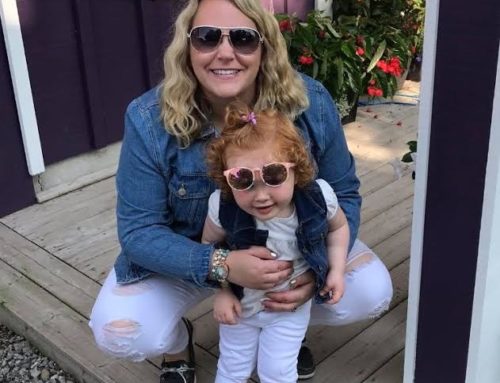
In the last article, I mentioned how essential it is for those suffering from mental health disorders to have a supportive community surrounding them. This community can be friends, coworkers, neighbours, but most often it is the immediate family that step up to support and guide. When this doesn’t happen, it can create an even more dire situation for the person suffering. Without feeling loved, supported and understood, the person can fall into a deeper depression and could easily feel as though there is no reason to go on.
Today’s article tells the heartbreaking story of a wife and mother who has had to go on a mental health journey without the support of her husband.
This story is in no way designed to criticize her husband, but to show how the caregivers need to be educated and supported too, as they take on the daunting task of helping someone they love. Often when we are thrust into the role of caregiver, we struggle with our own insecurities and wonder how we can possibly help someone in need.
This interviewee has chosen to remain anonymous; names have been changed and certain details changed or omitted to protect the identities of those involved.
When I sat down to meet with Sarah, she came across as a softly spoken, well put together woman in her 50’s. Her nails were impeccably painted red and she held her hands tightly in her lap, nervous and reserved. I started the interview the same way I always do, asking them if they would mind taking me back to the beginning, back to their childhood.
“I grew up in a dysfunctional and unstable home as a child,” Sarah explains. “Mom and Dad were together, but my father had a really bad temper.” She recalls never feeling secure as child, or loved.
“I have three older brothers, they experienced physical abuse from my father, I never remember being hit, but there was a lot of verbal abuse directed at me,” she said.
She describes growing up in poverty, and explained how there were times where there wasn’t food in the home. Sarah talks about visiting neighbours homes and feeling the disconnect between her life and their lives, “I would go to their house and they would have pretty things and nice lunches,” she remembers, “It seemed so special, they had pretty homes, ours was ragged.”
Growing up in a family where her father controlled most aspects of their life she said she always felt like something wasn’t right and couldn’t turn to her mother for help or support.
“Mom was very docile, and she allowed Dad to behave the way he did,” she explains, “She wasn’t much help, I didn’t feel protected by her as a child.”
Sarah as an adult has been able to better understand the behaviour of her parents and the dynamic of the household, “My parents desperately needed help, but they couldn’t help me, they couldn’t even help themselves.”
We went on to discus when she realized she had mental health problems and she says she became aware of it, even as a young child, but that there wasn’t a lot of education or understanding of things like depression when she was growing up, “I was a melancholy child, I kept to myself a lot,” she remembers, “The dynamics in the house would stress me out, it would build, I would get angry and cry and then I would feel some release.”
This pattern of getting upset, angry, crying and then feeling some release, was the theme throughout her childhood. She explains how she used running and exercising as a tool to cope, but that she would follow it up with binge eating, “It was totally ridiculous and unhealthy, but I didn’t know what other skills to use to cope.”
An educated woman, Sarah went to Wilfred Laurier University to obtain her Bachelors in Psychology, and then got married and stayed home to raise her two children. She told me that this was one of the hardest times in her life.
“That was a rough period, staying home,” she says, “My husband worked all the time and there were marital issues.”
She noticed early on in her marriage, that her husband had extremely high standards for her and that he didn’t understand or sympathize with the dysfunction of her childhood. “I didn’t know how to cook and take care of the house,” she explains, “I wasn’t taught that as a child.” When I asked her how her husband would respond to her she said, “He would tell me, you’re an adult now, grow up.”
During this time of being home raising their children, she said she experienced high levels of anxiety and lots of crying and low moods. She felt like she was experiencing “mini nervous breakdowns” on a regular basis, which only further frustrated her husband. She said how she would try to hide her emotions from her husband, but that it was getting harder for her to function. She remembers times where her husband would put her down for her inability to function, “he would say things like, if I need someone to clean the house, I can get a housekeeper, I don’t need you.”
She also recalled the hurt she felt after gaining weight taking anti-depressants. As someone who had always been self conscious, she was upset at the changes in her body during that period of her life. “My husband would say he didn’t like my body after I gained weight,” she explained, “I’d go to the gym, I’d try to eat healthily, but he essentially rejected me, even for my appearance, which just made me feel worse about myself.”
After a period of counselling and coping with a chronic back injury that left her in constant pain, she was diagnosed with clinical depression. She was so desperate around 2007, that she drove herself to Homewood in Guelph, but was unable to get treatment there as she didn’t have a referral.
She did eventually get a referral to Homewood where she stayed for five weeks and was able to go home at weekends to be with her family. After returning from Homewood and completing the five weeks her husband had made a big decision, “His exact words were that he didn’t love me anymore and that he was going to do his own thing.”
From 2007, ‘til now, Sarah and her husband live under the same roof, but they live separate lives. “I have had to build my own life without him, it has been extremely hard,” she said, “My girlfriends say I should go out on my own, but I don’t think I can emotionally handle it at this stage of my life.”
During the interview, I asked her if she still loved her husband, despite him leaving her in her biggest time of need, “I do still love him,” she answered, “If he came to me and said he wanted to work on things, I would be a little reluctant, but I would probably say yes.”
Sarah credits two good friendships for helping her though the depression, and says she went to live with one of her friends for a month after missing her medication for a few days and relapsing. Along with their support she shares the following things that have helped her:
- Ongoing counselling
- Exercise
- Reading
- Social get togethers with friends (even though she is more introverted.)
- Her faith/Church support
Even though she has come a long way, she says there are still situations that cause her a great deal of anxiety. “I don’t like to be alone for too long, I don’t like long weekends, my husband is gone all the time and I feel like I have been left alone,” she explains, “I hate New Years, I feel like the whole world is celebrating except for me.”
Sarah is an incredibly strong woman who has been on a difficult journey, but she remains optimistic for her future and acknowledges the strength she has demonstrated through her depression. “I can get through this, I have been successful in putting my life back together and believing in myself,” she says, “I can have a life of my own, even without my marriage.”
She loves the work she now does with young children as an Early Childhood Educator and she feels that it is a rewarding job. “It can be a tough job if you really care about the children,” she explains, “But, children are so innocent in their love and they give back to you as you give to them.”
Her final advice for anyone reading this is, “I don’t want to come off as if I don’t understand, but I do believe it takes an active approach to treat depression. There are cases where medication can give life back to a person, but you also need to take care of yourself spiritually and physically, be proactive and treat the whole person.”
She hopes that now she is experiencing a long period of stability in her life, sharing her story will help give back and let others know that they aren’t alone and that they can’t give up! “We have to always be working on this, we can’t stop even if we think we are cured, this is a life long journey.”









 Sharon Walker, MSW, RSW
Sharon Walker, MSW, RSW Jordon Iorio Hons. BA, RSW
Jordon Iorio Hons. BA, RSW Christine Bibby, B.S.W., M.S.W., R.S.W.
Christine Bibby, B.S.W., M.S.W., R.S.W. Brianna Kerr, RSW
Brianna Kerr, RSW Danielle Vanderpost, RSW
Danielle Vanderpost, RSW Daniela Switzer, MA, C.PSYCH
Daniela Switzer, MA, C.PSYCH Tammy Adams
Tammy Adams Jade Bates, RMT
Jade Bates, RMT Caitlin Schneider
Caitlin Schneider Dr. Crysana Copland
Dr. Crysana Copland
 Amy Dougley
Amy Dougley Emily Kamminga
Emily Kamminga Bill Dungey, RSW
Bill Dungey, RSW



 Jessica Moore, RSW
Jessica Moore, RSW Abigail Wragge, RSW
Abigail Wragge, RSW Melanie Clucas
Melanie Clucas Ally Legault
Ally Legault Kunle Ifabiyi
Kunle Ifabiyi